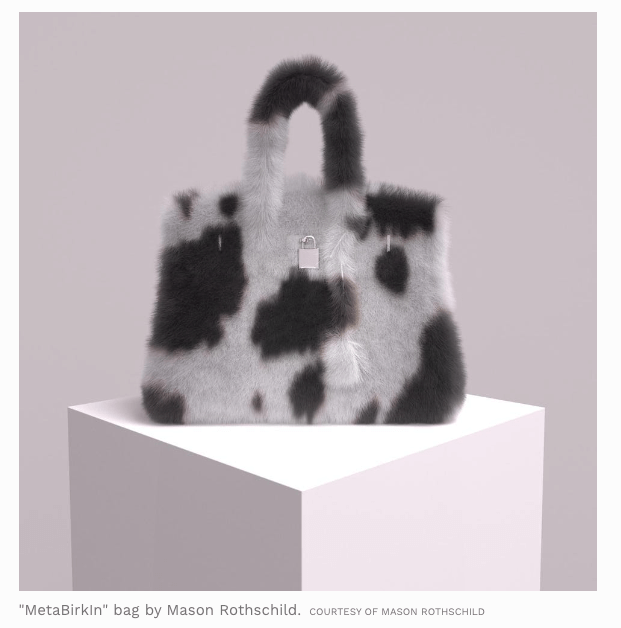[ad_1]
In a case poised to send ripples across the NFT landscape, luxury goods maker Hermès is suing artist Mason Rothschild over a 100-edition NFT collection it says violates its trademark of the iconic Birkin bag.
In December 2021, Rothschild uploaded a 100-edition NFT collection to OpenSea, releasing the “MetaBirkins” collection in what he said was:
“A tribute to Herm[e]s’ most famous handbag, the Birkin, one of ‘the most exclusive, well-made luxury accessories. Its mysterious waitlist, intimidating price tags, and extreme scarcity have made it a highly covetable ‘holy grail’ handbag that doubles as an investment or store of value.’”
Rothschild, who also describes himself as a “digital creator” and “web3cowboy”, sold 100 editions of the NFT for more than $1,000,000 in profit, including one edition that sold for 100 ETH.

Not long after, in January 2022, Hermès sent cease and desist letters to both Rothschild and OpenSea, causing the latter to take down the NFT collection from its marketplace.
Rothschild then responded by selling the NFTs on other platforms and registering the www.MetaBirkins.com domain with a disclaimer:
“We are not affiliated, associated, authorized, endorsed by, or in any way officially connected with HERMES, or any of its subsidiaries or its affiliates. The official HERMES website can be found at www.Hermes.com.”
Rothschild is arguing that his NFTs should be considered original artworks, not unlike Andy Warhol’s silkscreens of Campbell’s soup cans, which fall under the First Amendment, protecting individuals’ rights to freedom of speech and artistic expression.
In court filings made by Rothchild’s lawyers leading up the the trial, they cited a 1989 case, Rogers v. Grimaldi, which shields from infringement liability those works that are both an artistic expression and do not explicitly mislead consumers. The presiding court Judge Rakoff agreed, stating that while Rogers applied, questions attesting to what is a digital commodity versus what is a digital artwork have not been established.
The case will likely lead to an important precedent within the Web3 space, in which virtual metaverses are increasingly populated with virtual commercial goods, as well as art.
Legal experts add that the case will set an important precedent for defining trademarks across the Web3 space.
“[The Birkin case] will give us more guideposts for what to do with NFTs.”
Thomas Brooke, a lawyer at Holland & Knight, told The Wall Street Journal. He addedL
“With any new technology the courts are often having to apply existing law and figure out what works.”
Hermès is petitioning the court to have Rothschild cease and desist from all activities regarding the MetaBirkin NFT, including surrendering the MetaBirkins.com domain name and forfeiting damages including profits from the sale of the digital assets — which amount to over $1,000,000.
It is not the first time a case involving intellectual property rights and NFTs have been heard by U.S. courts. Nike is currently suing StockX, a sneaker reselling platform that integrates NFTs linked to the physical shoes it resells, for incorporating the brand’s iconic swoosh into its non-fungible assets.
StockX argues that it uses the NFTs as a quicker way to vet ownership with sellers looking to flip shoes without the burden of having to actually ship them.
Hermes International v. Rothschild is set to begin on Jan. 30 in the Southern District of New York.
[ad_2]
Read More: news.google.com









 Bitcoin
Bitcoin  Ethereum
Ethereum  Tether
Tether  XRP
XRP  Solana
Solana  USDC
USDC  TRON
TRON  Dogecoin
Dogecoin  Lido Staked Ether
Lido Staked Ether  Cardano
Cardano  Wrapped Bitcoin
Wrapped Bitcoin  Hyperliquid
Hyperliquid  Wrapped stETH
Wrapped stETH  Sui
Sui  Bitcoin Cash
Bitcoin Cash  Chainlink
Chainlink  LEO Token
LEO Token  Stellar
Stellar  Avalanche
Avalanche  Toncoin
Toncoin  WhiteBIT Coin
WhiteBIT Coin  USDS
USDS  Shiba Inu
Shiba Inu  WETH
WETH  Wrapped eETH
Wrapped eETH  Litecoin
Litecoin  Binance Bridged USDT (BNB Smart Chain)
Binance Bridged USDT (BNB Smart Chain)  Hedera
Hedera  Monero
Monero  Ethena USDe
Ethena USDe  Polkadot
Polkadot  Bitget Token
Bitget Token  Coinbase Wrapped BTC
Coinbase Wrapped BTC  Uniswap
Uniswap  Pepe
Pepe  Pi Network
Pi Network  Aave
Aave  Dai
Dai  OKB
OKB  Ethena Staked USDe
Ethena Staked USDe  Bittensor
Bittensor  BlackRock USD Institutional Digital Liquidity Fund
BlackRock USD Institutional Digital Liquidity Fund  Aptos
Aptos  Cronos
Cronos  Internet Computer
Internet Computer  NEAR Protocol
NEAR Protocol  Jito Staked SOL
Jito Staked SOL  sUSDS
sUSDS  Ethereum Classic
Ethereum Classic